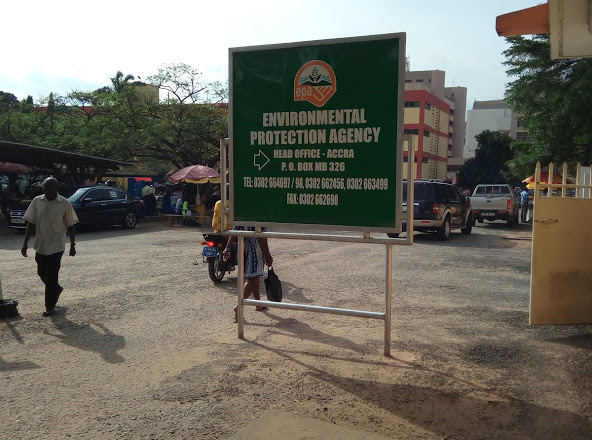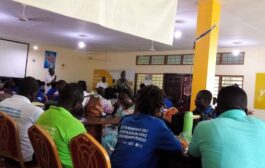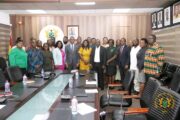Ghana’s Environmental Protection Agency (EPA) is initiating measures through the Africa Environmental Health and Pollution Management Program (AEHPMP) to address mercury pollution and achieve zero mercury use in mining communities in accordance with the Minamata convention on mercury.
In a keynote address delivered on behalf of the Executive Director of EPA, Hon. Henry Kwabena Kokofu at the Africa Environmental Health and Pollution Management Program (AEHPMP) Campaign on the health effects of mercury use on miners and communities at Bunso Cocoa College in the Eastern region, the Deputy Executive Director of the Environmental Protection Agency EPA, Mr Ebenezer Appah- Sampong revealed that unregulated and abuse of mercury use predominantly by artisanal and small-scale gold miners are adversely affecting the safety of food chain through fisheries in the various local and regional fishing areas which are eaten by human and bioaccumulates.
This he said is resulting in many illnesses.
Mr Ebenezer Appah-Sampong said, “the informal, unsafe and unregulated nature of mercury use creates a legacy of severe and irreversible environmental and health damage, mercury contamination could have serious economic consequences on the lucrative local and regional fisheries due to the potential health risks associated with it bioaccumulation in parts of the food chain, it is, therefore, our priority to reduce and where feasible, eliminate mercury use in artisanal and small- scale gold mining”.
“Mercury contamination is dangerous to human and environmental health, it is reported that for every gram of gold produced by Artisanal Small-Scale Gold Mining (ASGM), 2 grams of mercury is released into the environment, with 39% emitted into the atmosphere while the remaining 61% is discharged into surface and groundwater as well as soils and sediments” he added.
He stressed further that “the growth of the sector has resulted in increased use of mercury where approximately 80% of elemental mercury imported is used in ASGM operations to recover gold”.
“Artisanal and Small-Scale Gold Mining (ASGM) is estimated to be responsible for over 700 tonnes per year of mercury emissions to the atmosphere and an additional 800 tonnes per year of mercury releases to land and water, making it the largest man-made or anthropogenic source of mercury” he explained.
Regarding the dangers associated with mercury to human health, he noted further that several reports have highlighted heightened levels of mercury in the blood, urine, hair and fingernails of artisanal miners as well as in persons in communities near mining sites as a result of mercury exposure and contamination which poses serious health implications on affected persons including tremors and sleep disorders, numbness, cardiovascular problems, hyperkeratosis increased thickness of the outer layer of the skin, diabetes and acute respiratory infections.
Henry Kokofu said, Artisanal Small-Scale Gold Mining (ASGM) activities have increased steadily since 1986 and the sector now accounts for 30% of Ghana’s total gold output of which the Artisanal Gold Council Report in 2016 estimated that 70 tons of mercury are used in the ASGM industry in Ghana.
The Africa Environmental Health and Pollution Management Programme (AEHPMP) sponsored by World Bank was launched in April 2021 and is aimed at reducing environmental health risks related to harmful chemicals and waste by strengthening institutional partnerships and building capacities in pollution management in selected African countries including Kenya, Senegal, Tanzania, Zambia and Ghana.
The programme which is being implemented by the Ministry of Environment, Science, Technology and Innovation with EPA as the lead agency is under the theme “Your Life is Worth More Than Gold: Protect Against Mercury”.
It is expected to contribute to improving practices of artisanal and small-scale miners and competitiveness through increased adoption of new mining technologies, enhanced land and water management practices, and adoption of safer and environmentally sound techniques.
The Project Coordinator of Africa Environmental Health and Pollution Management Programme (AEHPMP), Mr Larry Kotoe also stated that the aim of the project is to eliminate the use of mercury in mining by 2025, and rather educate miners on the use of technological ways which does not require the use of mercury in mining since mercury poses serious environmental and health threat to miners and mining communities.
“This is an awareness campaign we are embarking on, mercury has an adverse effect on our environment and our health so our project seeks to educate the miners on the effects, we also seek to eliminate mercury in mining so we are bringing on board the use of technological way of mining without the use of mercury which will protect your health as well as the environment, the project is a five years project which began in 2020 and suppose to end in 2025 but due to covid the program was delayed along the line but we are coming back strongly next year and we hope there will be a significant improvement of the campaign” he explained.
Source: Mybrytnewsroom.com/Obed Ansah



















































